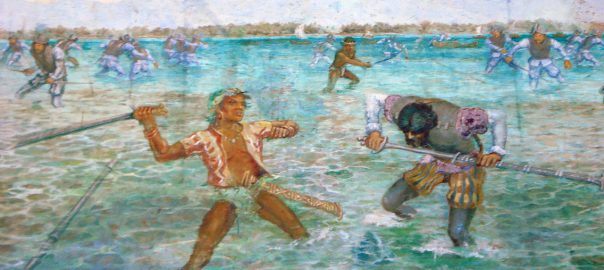The main actors I’d identified in my 1520 post all remained active in 1521:
- Martin Luther appeared as ordered before the Diet of Worms, which had been convened by the “Holy Roman Emperor” to examine his heretical beliefs. Luther refused to recant and made a speedy getaway before May 25, when the HRE declared him an outlaw.
- Suleiman the Magnificent put down a revolt in Damascus and headed for Belgrade.
- Ferdinand Magellan, having traversed the soon-to-be-eponymous Straits, sailed to many spots in the Pacific including Guam and the (later-named) Philippines, where on April 27 he was killed by a warrior loyal to Indigenous Mactan leader Lapu-Lapu (pictured above in a modern painting at the Lapu-Lapu Shrine.)
- In August, Spain’s Hernán Cortés was finally able to take Tenochtitlan and win the surrender of Cuauhtémoc, the last Tlatoani (Aztec Emperor). The whole Aztec Empire was then incorporated into the Spanish Empire.
- Also, as I’d previewed in the 1520 post, in April 1521, a Ming imperial fleet defeated a Portuguese fleet in the Battle of Tunmen (thought to be near today’s Hong Kong.) However, the Portuguese continued to maintain an active presence in many spots in East Asia.
To summarize: 1521 was a big year for Spain’s empire-building– both in Mexico and in the Philippines (where it continued, even after Magellan’s killing.) But already, in Germany, Luther and his heresies were starting to dent the Catholic monopoly of Christianity in Europe.
Magellan
Magellan’s career was extraordinary. He was the first European– probably the first human ever?– to sail all around the world. And he also “jumped ship” halfway through the venture: he did the first part of his circumnavigation (around Africa, to Malacca in current Malaysia) as a Portuguese sea-captain, then won the support of Spain’s King Charles I to undertake the second part, around South America to Cebu in the Philippines. It’s worth noting that the division of “discoveries”– that is, colonial spoils/takings– in the Atlantic world had been divided, east-west, between Spain and Portugal in the Treaty of Tordesillas of 1494. It wasn’t till 1529 that the two big Catholic coastal powers agreed how to divide the spoils in the Pacific world. Spain got to keep the Philippines.
Some reflections
A couple of further reflections here. First, I grew up in Britain and received all my schooling there, and then most of my professional research and writing as an adult have concerned the Middle East. It was only over the past year or so that I began seriously to research the question of how it was that “White”-dominated, European-heritaged powers came to dominate the whole world system from roughly 1800 on. So I do not pretend to be a specialist!
My researches so far have, however, forced me to look in greater depth than I ever did previously at several aspects of the history of the past 500 years, such as:
- the outsize roles that Spain and Portugal played in the emergence of Europe’s domination of the world;
- the key role that the completely slavery-reliant sugar plantations that European colonial powers (especially England’s) played in fueling the development and continuation of the transatlantic slave trade in its early centuries– and also in providing the financial, administrative, and technological infrastructure for the emergence of capitalism and the “Industrial Revolution” in England itself; and
- the big contribution that development and maintenance of their various global empires made to the consolidation of the “home” nation-states within Europe itself.
I will hope to write some posts in this “Project 500 years” series that reflect on some of these questions more deeply. But in the first instance, and as a warm-up, my main “New Year’s Resolution” here is to write one post per day that summarizes the key developments– as I see them– of each successive year since 1520. This will serve the dual purposes of (a) giving me a small but significant writing task to do each day, and (b) starting to lay the intellectual basis for the bigger writings I hope to do soon on the whole phenomenon of the West’s 500-year domination of the world system.
Also, fwiw, I’m finding this dive back into the past 500 years to be really interesting.
